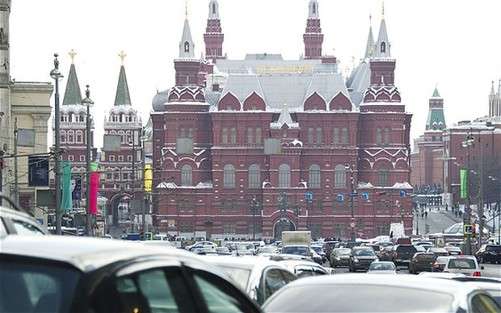因報(bào)道稱(chēng)莫斯科一些救護(hù)車(chē)經(jīng)內(nèi)部改裝后以高價(jià)出租為商務(wù)人士提供出行服務(wù),莫斯科警方將于近期對(duì)救護(hù)車(chē)開(kāi)展專(zhuān)項(xiàng)檢查。同時(shí),警方也發(fā)現(xiàn)網(wǎng)絡(luò)上已有所謂“救護(hù)出租車(chē)”的廣告,每小時(shí)收費(fèi)高達(dá)6000盧布(約合194美元)。莫斯科的主干道和環(huán)路經(jīng)常因?yàn)閬y停車(chē)和不守規(guī)矩的駕駛行為而持續(xù)擁堵,救護(hù)車(chē)出行時(shí)可以通過(guò)警笛聲讓其他車(chē)輛讓路,這一優(yōu)勢(shì)被不少趕時(shí)間的商務(wù)人士看重。據(jù)報(bào)道,此前已有交警在執(zhí)勤時(shí)發(fā)現(xiàn)此類(lèi)“救護(hù)出租車(chē)”,車(chē)內(nèi)裝飾豪華,所有人均著便裝且不愿透露身份。為了緩解莫斯科交通擁堵,俄羅斯總統(tǒng)普京已表示大部分時(shí)間會(huì)在家辦公,以減少出行時(shí)的交通管制;而俄羅斯總理梅德韋杰夫則表示會(huì)多選擇直升機(jī)出行。

 |
|
Moscow's boulevards and ring-roads often stand still because of ill-parked cars and no restrictions on driving in the city centre. |
Police in Moscow are to carry out special checks on ambulances after reports that emergency vehicles have been fitted with plush interiors and are being rented out to VIP commuters hoping to dodge the city's abysmal traffic jams.
Random checks will be performed on the vehicles after companies advertising rides in "ambulance-taxis" for upwards of 6,000 roubles (£120 or $194) per hour appeared on the internet.
The vehicles are said to use their sirens to scatter traffic and deliver harried businessman to meetings on time.
A law enforcement source told Izvestiya newspaper that one such vehicle had already been identified. "During one patrol, a medical car was stopped because it was breaking traffic rules," said the source.
"The driver appeared strange, and did not resemble an ambulance driver at all. The police officers opened the automobile to check it and saw that the interior was fitted out like a high-class limousine with comfortable seats for transporting VIP passengers." The source added that inside the ambulance were "not medical personnel but some people in civilian clothes who refused to identify themselves."
Moscow's boulevards and ring-roads often stand still because of ill-parked cars and no restrictions on driving in the city centre. The foul-ups are compounded when police block off roads for official cortèges such as that of Vladimir Putin, who causes gridlock when travelling to and from the Kremlin in his Mercedes Pullman.
In October, Mr Putin's spokesman said the president would spend more time working at his home, the Novo-Ogarevo estate to the west of the city, to avoid producing bottlenecks. Prime Minister Dmitry Medvedev's office said he would be travelling more frequently by helicopter.
(Source: Telegraph.co.uk)
相關(guān)閱讀

(中國(guó)日?qǐng)?bào)網(wǎng)英語(yǔ)點(diǎn)津 Helen )
